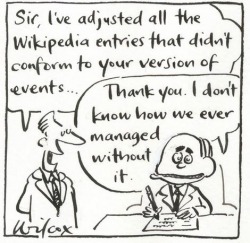I learned a lot about Wikipedia in this chapter: about how it fits the produsage model and about how it differs from traditional encyclopedias (much the same way that citizen journalism differs from traditional journalism). And I could go on about that for at least half a page, but that is not what really caught my attention, and if you been reading about produsage in this blog for a while, then you too can figure out how Wikipedia fits this model.
What caught my attention was when Bruns quotes [b]oyd as arguing that "'many librarians, teachers and academics fear Wikipedia (not dislike it) because it is not properly understood, not simply because it challenges their privilege, just as most new systems and media are feared by traditionalists of all sorts'" (130). Amen brother. Bruns then points out that "it is incumbent on teachers and academics to make their students familiar with the inherent shortcomings of any of the research tools and sources they may be tempted to utilize" (132).
I can't tell you how many times I have sat with a group of peers who criticize the fact that students use Wikipedia as a resource at all. We fear what we do not understand, and many do not understand the fact that a community of users can create content and edit it pretty much at will. Are there things that are misrepresented? Hell yes, but aren't there plenty of "facts" in encyclopedias that have been changed over the years? Bruns makes a point of saying that encyclopedias aim to "encapsulate the current state of accepted knowledge" while Wikipedia attempts to present a "representation of knowledge" (103). Put another way, encyclopedias attempt to portray a "universal truth" as determined by "dead white guys" while Wikipedia attempts to represent a living and diverse knowledge.
We are always talking about valuing the knowledge with which our students walk into our classrooms. This knowledge is a living knowledge. It is growing and morphing everyday. Instead of banning the use of Wikipedia, why don't we use it to help them develop critical reading and thinking skills? Why don't we educate them on ways of determining if an entry on the website is reliable? If we are asking them to do research, is it too much to actually "teach" them how to do that research? It's not gonna help them if we just BAN the use of Wikipedia because it sometimes has mistakes. That's like asking you parents "Why" and them telling you because it's bad without ever sitting you down and explaining what exactly is "bad" about it. And not ALL of Wikipedia is "bad." There is actually quite a bit that is good about it. And if they are using it, then we need to help them learn how to use it effectively. Not just tell them they can't because it's BAD!!

 RSS Feed
RSS Feed

